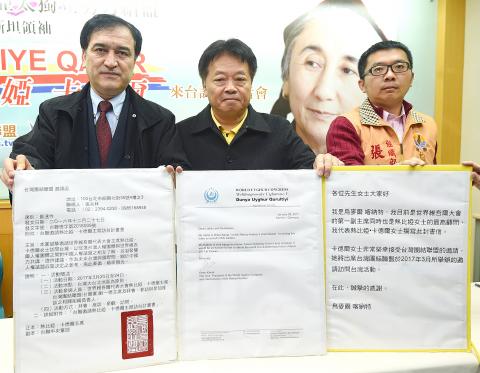World Uyghur Congress president Rebiya Kadeer has accepted an invitation from the Taiwan Solidarity Union (TSU) to visit Taiwan at the end of March, which would be the activist’s first visit to the nation.
The visit, if approved, would see Kadeer hold talks with Taiwanese activists and politicians about human rights, self-determination and independence.
In a video played at a news conference in Taipei yesterday, Kadeer expressed a deep interest in visiting Taiwan, and connecting with local activists and politicians, urging the government to give the green light to her visit.

Photo: Liao Chen-huei, Taipei Times
“Taiwan is in unity with East Turkestan, Tibet and Southern Mongolia. We have to help each other, and exchange opinions and experiences at all times,” Kadeer said. “We support all the movements you launch in the name of freedom and we also need your support.”
She congratulated President Tsai Ing-wen (蔡英文) on her election victory last year and expressed support for Tsai’s administration.
Japan Uyghur Association president Ilham Mahmut said Kadeer had long been planning to visit Taiwan, but the administration of former president Ma Ying-jeou (馬英九) denied her entry in 2009, even though Kaohsiung Mayor Chen Chu (陳菊) had helped file a visa application for Kadeer’s participation at a film festival.
Having criticized the former administration’s treatment of the human rights activist, the Democratic Progressive Party (DPP), now in power, should be open to Kadeer’s visit, Mahmut said.
Though enshrined in China’s constitution, religious freedom is not allowed in reality, with conflicts between Uighurs and Chinese authorities often resulting from forceful intervention in religious practices, such as growing a beard and wearing a hijab, he said.
Press freedom is also prohibited and China’s state-run news outlets only publish stories that demonize Uighurs as terrorists, he added.
While China sources one-third of its energy from East Turkestan, about 90 percent of Uighurs are farmers and are living in poverty, he said.
“Should Uighurs not resist [China] under those circumstances?” he asked. “We are not different from Taiwanese. We are not different from people in other countries. We yearn for freedom and hope to run our own country on our ancestral lands.”
Kadeer’s visit would forge a bond between people subject to China’s suppression such as Uighurs, Taiwanese, Tibetans, Mongolians and Hong Kongers, TSU Chairman Liu I-te (劉一德) said.
Local pro-independence groups are generally indifferent to independence movements in other nations, but collaborating with foreign independence groups is necessary to counter China, Liu said.
“The TSU will stand together with the so-called separatist groups and help them resist Chinese imperialism,” Liu said.
The government should forsake the Constitution’s territorial claim on China — including Xinjiang, Inner Mongolia, Tibet and the South China Sea — and draw a clear line between Taiwan and China, he added.
Presidential Office spokesman Alex Huang (黃重諺) yesterday said any individual’s visa application would be handled by the concerned government agencies in accordance with the relevant regulations.
Additional reporting by CNA

Taiwanese can file complaints with the Tourism Administration to report travel agencies if their activities caused termination of a person’s citizenship, Mainland Affairs Council Minister Chiu Chui-cheng (邱垂正) said yesterday, after a podcaster highlighted a case in which a person’s citizenship was canceled for receiving a single-use Chinese passport to enter Russia. The council is aware of incidents in which people who signed up through Chinese travel agencies for tours of Russia were told they could obtain Russian visas and fast-track border clearance, Chiu told reporters on the sidelines of an event in Taipei. However, the travel agencies actually applied

New measures aimed at making Taiwan more attractive to foreign professionals came into effect this month, the National Development Council said yesterday. Among the changes, international students at Taiwanese universities would be able to work in Taiwan without a work permit in the two years after they graduate, explainer materials provided by the council said. In addition, foreign nationals who graduated from one of the world’s top 200 universities within the past five years can also apply for a two-year open work permit. Previously, those graduates would have needed to apply for a work permit using point-based criteria or have a Taiwanese company

The Shilin District Prosecutors’ Office yesterday indicted two Taiwanese and issued a wanted notice for Pete Liu (劉作虎), founder of Shenzhen-based smartphone manufacturer OnePlus Technology Co (萬普拉斯科技), for allegedly contravening the Act Governing Relations Between the People of the Taiwan Area and the Mainland Area (臺灣地區與大陸地區人民關係條例) by poaching 70 engineers in Taiwan. Liu allegedly traveled to Taiwan at the end of 2014 and met with a Taiwanese man surnamed Lin (林) to discuss establishing a mobile software research and development (R&D) team in Taiwan, prosecutors said. Without approval from the government, Lin, following Liu’s instructions, recruited more than 70 software

Chinese spouse and influencer Guan Guan’s (關關) residency permit has been revoked for repeatedly posting pro-China videos that threaten national security, the National Immigration Agency confirmed today. Guan Guan has said many controversial statements in her videos posted to Douyin (抖音), including “the red flag will soon be painted all over Taiwan” and “Taiwan is an inseparable part of China,” and expressing hope for expedited reunification. The agency last year received multiple reports alleging that Guan Guan had advocated for armed reunification. After verifying the reports, the agency last month issued a notice requiring her to appear and explain her actions. Guan